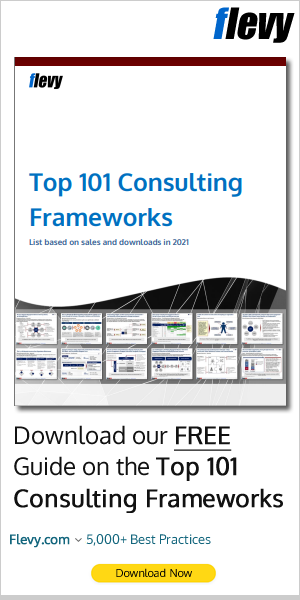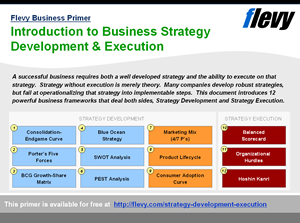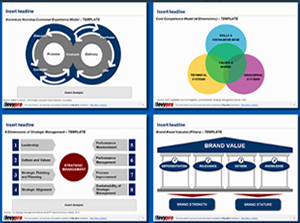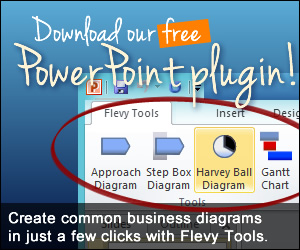Editor's Note: Take a look at our featured best practice, Strategic Planning: Process, Key Frameworks, and Tools (79-slide PowerPoint presentation). This document provides a holistic approach for undertaking strategic planning. While covering the traditional strategic planning approach, the document touches on adaptations that may be used in an unpredictable environment. Contents: 1. Strategic Planning Overview - Key questions and [read more]
Flevy Author Spotlight: Our Interview with Strategic Planning Specialist, Anthony Gable
Also, if you are interested in becoming an expert on Strategy Development, take a look at Flevy's Strategy Development Frameworks offering here. This is a curated collection of best practice frameworks based on the thought leadership of leading consulting firms, academics, and recognized subject matter experts. By learning and applying these concepts, you can you stay ahead of the curve. Full details here.
* * * *

He has been involved in hundreds of planning sessions with product groups and Strategic Business Units in a variety of young, smaller companies, as well as larger, better known organizations, including 3M, Gillette, Zenith, Sunbeam, Rubbermaid, DEC, Stewart-Warner, and many others. These organizations represent myriads of different industries and products, including those in consumer, medical, electronics, and other market niches.
We recently had the opportunity to speak with Mr. Gable and pick his brain on the topic of Strategic Planning.
You developed a “unified” approach to strategic planning. Can you describe how it is unified?
Strategic planning processes were initiated in the “modern” world back in the 1950s by university business school professors and large consulting firms. At the time, the most used concept was the matrix system used by a major consulting firm. It was used to help clarify simplistic and basic characteristics of a company, primarily where it fit in terms of its market strength and share.
Since then, there have been countless attempts to embellish other “systems” with new approaches–to the point where there are now tens of tens of acronyms being employed to identify them. Examples include BCG Matrix, Five Forces, PIMS, SWOT, PEST, PESTLE, 5C, and so on. There is also a vast number of articles, books, seminars used to clarify all of them individually.
This often results in only confusing the audience of management and owners as to how these approaches should be used and integrated, if used together at all. Other approaches concentrating on various analyses are prevalent as well–internal analysis, external, environmental, economic, social, political, etc. What has been made available is primarily focused on these processes, which have now become generic, and, in general, very often not applicable to individual situations faced by organizations large and small.
The problem is that all they seem to do is define the differences and advantages of each separate approach, often when the systems are no longer valid for “today,” rather than integrate those that apply to today’s digital economy in a useful and effective way.
Our system and process is designed to unify as a whole those strategic planning processes that are effective, relevant, and effective in today’s world. It is intended to create an approach that makes users aware of those issues that they must consider as part of their overall approach to current success and future growth. In general, we do not refer to specific processes or acronyms in order to avoid confusion, but, instead, expose them in a continuum in which they should be defined, considered, and applied. We expose them with explanatory narrative that is easily understood by all involved via what we feel is the best approach: the use of slides that may not only be presented to groups of all sizes, but may also be printed out for convenient, individual study.
At what stage of growth should a business start engaging in annual strategic planning sessions?
Although “strategy” is part of every “business plan” used by start-up companies, it is normally based upon initial survival in building the new business, with less concern of the longer term effect of its market share position.
“Strategic planning” is typically used by companies of all sizes–small business included–when they reach a point where they are, in most part, successful, but need to reconsider their level of success and satisfaction with that current status versus where they would like to be in the future, in terms of market share, new product development, and growth in general. Strategic planning is also used by companies that are suffering and/or see no real future for growth ahead and may wish to downsize, be acquired, etc. Those same companies may find that reassessing their position through strategic planning may also place them back on a positive track to further success.
So, then, strategic planning is usually employed by companies and created to attack the longer term–3-5+ years–and is reviewed as often as quarterly or semi-annually. Whereas, a “business plan” is normally an initial, short term instrument for “getting going.”
What is your opinion on businesses hiring top consulting firms to help them orchestrate the strategic planning session?
I have more often than not found that most companies are fully capable and competent to do their own planning—and far better off–if availed of an effective process to use. Often, they simply don’t have a process that they can use effectively.
That’s where we come in. They know their business (although perhaps not their market) better than any outside, costly consulting firm. Our process allows them to become aware of the issues they should be cognizant of and also how they can make their employees aware of the logic and effort that needs to be understood by all to create employee buy-in and cooperation.
Using an outside consulting firm often creates resentment by internal and competent management. Others are then left out of the plan completely; or, forced to do the necessary implementation by outside facilitators. Employee acceptance is the most important aspect of effective strategic planning and ultimate team success and organization pride as a team effort.
What are some common strategic and organizational issues you’ve found small and midsize companies face?
Organizations of all sizes face an unending aptitude to make critical and non-critical errors. Examples include financial misuse of funds; unacceptable products or quality vs the new competition; lack of use of new ways to reach target clients; misunderstanding worldwide, political, and external issues that may greatly affect them; lack of employee depth or competence; poor supplier relationships and costs; ongoing changes in their niche market; lack of a thorough understanding of who, what, and where their real competition is; new product displacement about to happen; broken procedural and internal systems; manufacturing roadblocks or ancient processes; where they can best perform within a specific market-share level; lack of goal setting; lack of plan follow-up and monitoring of results; what stage of growth they are in and its related effect on planning approach; leadership issues; what type of planning is critical at the moment—for instance, issues, goals, integration, etc.
This all leads to our favorite quote: “It is not the strongest or the most intelligent who will survive, but those who can best manage change.” [Charles Darwin]
Anthony Gable has a couple instructional Strategic Planning guides available on Flevy. The Complete Guide to Strategic Planning is currently the best selling document on Flevy on Strategic Planning.

Want to Achieve Excellence in Strategy Development?
Gain the knowledge and develop the expertise to become an expert in Strategy Development. Our frameworks are based on the thought leadership of leading consulting firms, academics, and recognized subject matter experts. Click here for full details.
"Strategy without Tactics is the slowest route to victory. Tactics without Strategy is the noise before defeat." - Sun Tzu
For effective Strategy Development and Strategic Planning, we must master both Strategy and Tactics. Our frameworks cover all phases of Strategy, from Strategy Design and Formulation to Strategy Deployment and Execution; as well as all levels of Strategy, from Corporate Strategy to Business Strategy to "Tactical" Strategy. Many of these methodologies are authored by global strategy consulting firms and have been successfully implemented at their Fortune 100 client organizations.
These frameworks include Porter's Five Forces, BCG Growth-Share Matrix, Greiner's Growth Model, Capabilities-driven Strategy (CDS), Business Model Innovation (BMI), Value Chain Analysis (VCA), Endgame Niche Strategies, Value Patterns, Integrated Strategy Model for Value Creation, Scenario Planning, to name a few.
Learn about our Strategy Development Best Practice Frameworks here.
Readers of This Article Are Interested in These Resources

|
|
45-slide PowerPoint presentation
|
|
23-slide PowerPoint presentation
| |||
About David Tang
David Tang is an entrepreneur and management consultant. His current focus is Flevy, the marketplace for business best practices (e.g. frameworks & methodologies, presentation templates, financial models). Prior to Flevy, David worked as a management consultant for 8 years. His consulting experience spans corporate strategy, marketing, operations, change management, and IT; both domestic and international (EMEA + APAC). Industries served include Media & Entertainment, Telecommunications, Consumer Products/Retail, High-Tech, Life Sciences, and Business Services. You can connect with David here on LinkedIn.
Top 10 Recommended Documents on Strategic Planning
» View more resources Strategic Planning here.
» View the Top 100 Best Practices on Flevy.













